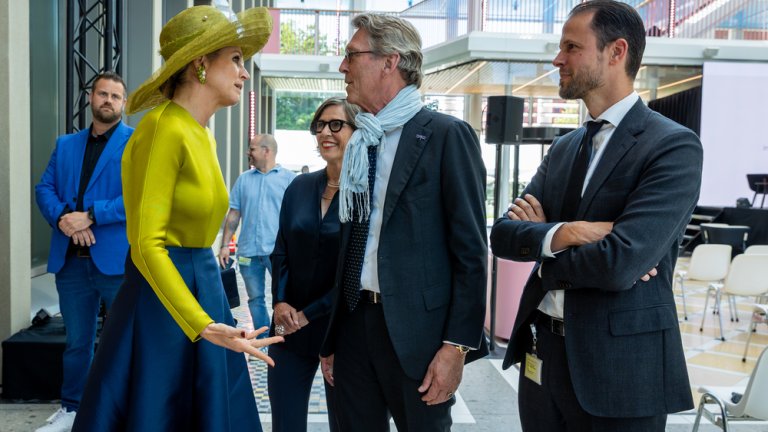The idea for RDC Adore originated seven to eight years ago from a conversation between Geert Kazemier, Oncological Surgeon at Amsterdam UMC, and Philip Scheltens, former Neurologist and Director of the Alzheimer Center Amsterdam. “The core concept was to combine research into cell growth and cell death,” Kazemier explained. “There was some scepticism at first, but momentum has been building. A deeper, more structural collaboration between oncology and neurology offers great potential.” “There’s also incredible energy,” added Jort Vijverberg, Neurologist at Alzheimer Center Amsterdam and Scheltens’ successor at Adore. “When you break down the disease silos and focus on the science itself, the ideas and energy just start to flow.”


Disrupted cells
Cells communicate extensively. In cancer, disruption of this communication can lead to cell proliferation and the unwanted spread of cells through the body, whereas in neurodegenerative diseases, like Alzheimer’s disease or Multiple Sclerosis (MS), cell communication becomes impaired and eventually lost, leading to cell death. Additionally, in both disease areas, the immune system may play an active role. Therefore, cancer biologists and neuroscientists can investigate shared molecular mechanisms.
New, targeted treatment strategies
Using ultra-sensitive techniques, researchers are visualizing cell-to-cell communication down to the level of individual cells within the so-called TRANSVISION project. They are particularly interested in the interaction between tumor cells and brain cells. By identifying which proteins play a role, the researchers hope to gain an understanding of how these processes become disrupted and how to intervene. This might open doors to new, targeted treatment strategies. “The better we understand cellular communication, the more effectively we can intervene and develop new therapies,” explains Guus Smit, Chairman of the Board of Directors of Amsterdam Neuroscience.
Inspiration through design
The RDC Adore building is intentionally designed to foster collaboration. Offices are directly located next to laboratories, departments are connected via a central courtyard, and researchers run into each other daily. This physical proximity fuels interdisciplinary exchange. Maarten Bijlsma, Scientific Director of Cancer Center Amsterdam, co-leads these efforts of cross-pollination with Smit. “By showing how you work, by sharing techniques and facilities, the researchers can inspire each other,” said Bijlsma. “Think of areas like immunotherapy or cell therapy.” Smit added, “Our researchers are only 200 meters apart. That kind of closeness encourages innovation and accelerates the development of breakthrough therapies.”


About Adore
Adore is an initiative of Amsterdam UMC, Cancer Center Amsterdam, Amsterdam Neuroscience, Alzheimer Center Amsterdam, and MS Center Amsterdam. The Amsterdam UMC and VU Amsterdam campus comprises over 2.000 oncology and neurology researchers, making it the largest onco-neuro campus worldwide. By integrating expertise in neurology and oncology, Adore fosters interdisciplinary collaboration and facilitates knowledge exchanges between these fields. The mission is to tackle critical healthcare challenges related to cancer and neurodegenerative diseases and accelerate affordable healthcare solutions for all. Jointly, Adore believes that disruptive thinking outside the established disease siloes, facilitating a comprehensive ecosystem and inhouse development throughout the entire translational pipeline will accelerate impact. Through this approach, Adore strives to enhance diagnostic accuracy, develop more effective and personalized therapies, and ultimately improve treatment outcomes for these complex conditions.
Geert Kazemier (Oncological Surgeon at Amsterdam UMC) and Jort Vijverberg (Neurologist at Amsterdam UMC, Alzheimer Center) are the General Directors of Adore, and Maarten Bijlsma (Scientific Director of Cancer Center Amsterdam) and Guus Smit (Chairman of Board of Directors of Amsterdam Neuroscience) are the Scientific Directors of Adore.
Visit the Adore website for researchers
Photography by Mark van den Brink

